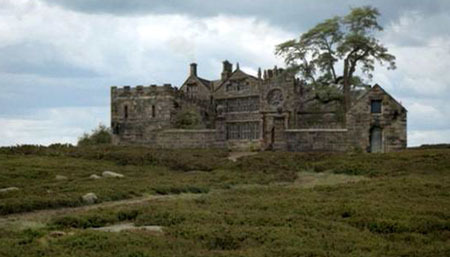My Problem with Sexed Up Classics
 I was recently taken to task by a commenter for being judgmental for replying that I didn’t want to read ‘yet another unoriginal retelling’ of a classic with the sex dumped in. This was in reference to recently produced and eroticised version of Wuthering Heights. This is the latest in a slew of sexed-up classics published in the last few years. There are a number of publishers releasing a whole raft of them.
I was recently taken to task by a commenter for being judgmental for replying that I didn’t want to read ‘yet another unoriginal retelling’ of a classic with the sex dumped in. This was in reference to recently produced and eroticised version of Wuthering Heights. This is the latest in a slew of sexed-up classics published in the last few years. There are a number of publishers releasing a whole raft of them.
The phenomenon of why books become classics and enter the canon in the first place is a very interesting one. I’m not going to address it here, because why certain texts become classics and who determines which texts deserve to be there is a cultural and social study in itself. This has been addressed by some of the most notable thinkers of the 20th Century.
Certainly, of more interest to me, because of my studies, is how eroticism has been written about through the ages. What choices and limitations authors practiced under in their times, and how they coped with those restrictions.
The particular book in question, in the comment, was Wuthering Heights. Wuthering Heights happens to be very dear to my heart for a number of reasons. To begin with, it has a strangely lopsided structure. It has two main characters, which was unusual for the time. And it continues to be, in my estimation, one of the most deeply erotic works ever written.
It’s not an easy book for modern readers to read, because the way Brontë used language is simply very different to the way we use it today. Admittedly, it’s not as hard to read as Chaucer or Shakespeare, but language does change with time and the very subtle ways in which we imply, hint, infer things have shifted radically. In any given time period, writers leave a lot out of their work; they make assumptions about what might seem obvious to a reader in their time. That also changes with the years. People don’t speak to each other in the same way as they did in 1850. So in the 21st Century, we are reading Wuthering Heights through something of a spiderweb of lost cultural nuance. Nonetheless, I believe one of the reasons it stands up so well, over 150 years later, is because the society Brontë is describing, the landscape, the atmosphere and the characters were probably quite strange, even in her time. In a way, Wuthering Heights is and has always been a piece of speculative fiction. (It is worth taking a look at a summary of the critical response to the novel when it came out – many contemporary critics found the language difficult as well)
Heathcliff is a particularly modern character. In the mid-19th Century, people didn’t often spend a lot of time obsessing about their identities in the way we do today. Usually, the main reason to ponder identity in those days revolved around inheritance, rather than our modern need to interrogate our ‘truths’. Yet both Emily and Charlotte Brontë do so; Jane Eyre is also very much a novel of identity. I’ve often wondered at the tremendous, subverted erotic tension that must have existed in the Brontë household, because both these women wrote about erotic desire in its most tempestuous and destructive form.
I first read Wuthering Heights at fourteen. Even then, I was perfectly aware of the sexual tension that electrifies the novel. By the time I read it again, at university, at the age of 23, I was fully capable of ‘filling in the unwritten’ eroticism in the novel.
Look, I’m a writer of erotic fiction, and you’d think I would be a staunch proponent of making ‘the implicit’ explicit. I’m not. I am first a writer and I honour the fact that, within the constraints of her time, Emily Brontë wrote as erotic a novel as she could. She used atmosphere, metaphor, dialogue, conflict and horror to eloquently paint a picture of an erotic desire so strong it survived past death. The eroticism is there, everywhere, in the text if readers would get off their cerebral asses and actively read the text. Just like in 1847, this is a novel where you, as the reader, are expected to use your very active imagination to make the implicit explicit.
Sexing up the classics, and especially this classic is, I believe, bad for our brains. In its original form, Wuthering Heights begs the modern reader to play ‘what if’ with their imagination. Time and cultural change challenge us to fill in the gaps of what could not be made explicit at the time. It exercises our erotic imaginations in a way that an explicit fuck scene never can.
Looking into the semi-opaque world of classic texts, and actively reading the eroticism into them as we read, is good for us. It keeps our minds fertile and questing. Reproducing those stories and adding in ten explicit sex scenes robs us of the opportunity to use our imaginative powers.
But more than all of that… what is it about us that we cannot value new stories? Are there no new stories left to tell? I don’t believe that.
Yes, I am a very judgmental writer. I don’t hide it and I don’t deny it. I think, if you are a REAL erotic fiction writer, you will find new stories to tell, not rehash old ones.


 newest »
newest »




Thank you, thank you for speaking out on this issue!
Wuthering Heights is favorite romance novel of mine that I read as a teen. I cringe to think what another author, amateur or experienced, has done to this work to make it better by either adding erotica or changing, deleting, scenes and dialogue etc.
I read The Sheik Retold, an unauthorized sexed up version of The Sheik last year, and then read the original The Shiek by EM Hull. I fell in love with The Sheik. It is a modern romance classic (almost 100 years old - pub'ed in 1919). The author's debut work and her opus written while her husband served her country in WWI.
I enjoy fan fiction, satires, spoofs, etc. and cheap pulp fiction and erotica.(Note: MaryReadsRomance is my Romance entertainment GR Id. I use another GR Id with my teens for serious family reading or for work related non-fict etc.) Most fan fict and other spin offs however use the new author's new prose with some references to the original storyline/characters, etc.
The changes in the sexed up modern classic I just read is much more invasive. I regretted having bought the sexed up and altered version. The new version was a bit crass (sex added and some too modern sexual terminology), and changes to he relationships significantly changed the storyline.
Worse yet, as there are no clear red lines, face type changes, nor notations, readers are not aware of what is EM Hull's prose VS what has been added, deleted, etc. specifically. Most readers have not read the original and so are actually attributing EM Hull's prose, story, characters, setting, etc. to the revising author! Most say they have not intention of reading the original and think the "new author" is amazing!
It is one thing to do condensed versions or translations or even satire spoofs and fan fiction with some original prose included. But copying another author's book in the majority and editing it to add erotica or change the story line, without the author's permission, is just unethical. For a new "revisionist" artist to assume they know best how to improve the original is amazingly insulting to the original artist and shows an amazing amount of hubris and frankly disrespect!
I am frankly horrified and disturbed to think that any deceased author's entire book's prose can eventually be copied ad edited wholesale with them then listed as as a secondary posthumous "co-author". Basically their work has been hijacked (or if copyright laws had applied it would be considered "plagiarized") by another author. The new author then then puts in a brief forward recounting their general changes and how they have "improved" the story!
As a result of my misadventure with this book, I have given the whole issue of books whose copyright have expired being edited freely and re-pubed some more thought and as this potential trend deeply disturbs me, I am speaking out.
I would be very interested in more of your thoughts, as a writer yourself, on this matter.
Also do you know of other threads, forums, etc. where this issue is or can be discussed?
Again, thank you for your excellent post.
Sincerely,
Mary